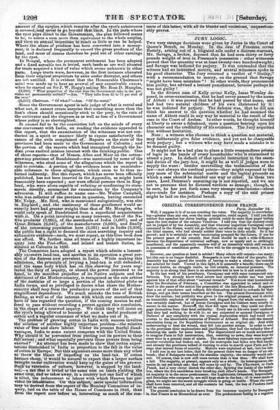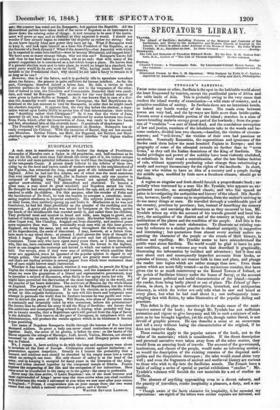ORIGINAL CORRESPONDENCE FROM FRANCE.
Paz-is, December 14.
Well, I suppose it is of no use counting the votes. The majority is overwhelm- ing—greater than any one, even the most sanguine, could expect. I told you that neither fine speeches nor clever leading articles could do more than paper bullets upon the iron statue of the column Vendome. I told you that the country could not be judged of by the Assembly, and that whatever majorities Cavaignac could command in the House, would not go further, nor affect in any way the feelings of the blind masses, who had already settled their votes in their minds. So it has proved; and it is certainly no very encouraging prospect for the future, if not for the present peace of the country, that there should be such a wide difference between the dispositions of universal suffrage, now so openly and so strikingly manifested, and the apparently resolute will of an Assembly which still remains in possession of constituent power. There will be the struggle to come, if it is to come.
However, one question at least is settled! Many others still remain—too many; but this one is no longer doubtful. Bonaparte is now the elect of the people; the Assembly has been spared the trouble of having to make a choice; the country has selected for itself. Viewed in this light, it is assuredly a benefit; there can be no more doubts, no struggle inside, no riot outside, no external pressure. The majority is so strong that there is no alternative but to bow to it and submit. In the last week of his presidency, Cavaignac met with some unexpected mis- fortunes. You already know what severe and certainly unfair use was made against him of that affair about "national rewards." You know that immediately after the Revolution of February, a Committee was appointed to select and re- ward in the name of the nation the prosecuted of the late Monarchy. It appears that a set of murderers and robbers felt themselves entitled to rewards for their doings, and got their names inscribed on the list. The present Government with- drew the motion; but publicity was given to the original proposal, and it elicited an irresistible explosion of indignation and disgust from the whole country. It was certainly deserved, but of course Cavaignac and his Cabinet were utterly in- nocent in the matter. Howeve", the blow fell upon them; they could not disen- gage themselves from that fatal solidarity. Every one in his own heart confessed that they had nothing to do with it; no one suspected or accused Cavaignac or Dufaure of any complicity with the cynical depravation which had voted civic crowns to the abominable memories of Fieschi or Alibaud. But still the doomed association hung on the Republican Government as an original sin. And while endeavouring to heal the wound, they fell into another scrape. In order to send to the provinces their explanations and justification, they had the unlucky idea of detaining the mails for some hours. The departments are so much accustomed to imagine Paris in full insurrection, that, receiving no news, they were kept for some time in a general state of alarm. The most fabulous rumours were spread: another revolution had broken out, and the metropolis had fallen into Red hands; and already the provinces talked of running to arms to march upon Paris and be- siege that eternal focus of anarchy. Matters were explained at last, but too late.
I told you in my last letter, that for the present there was no danger of an out- break; that if Bonaparte reached the absolute majority, the minority would sub- mit. Of course, that is now still more certain than it was then. We shall have a lull. The majority, at present, appears only as a whole; its heterogeneous ele.- meats do not yet break out; that will come by and by. The Charivari, or Pans Punch, had a very clever sketch the other day, figuring the inside of the ballot- box, where the five candidates were breaking each other's heads. The Bonapart- ist majority is in the same predicament: the Legitimists, Orleanists, Imperialists, and Socialists who compose it, are still kept close in the box; if it were made of glass, we might see the secret struggle which is going on inside. When the cover shall have been removed, and all the contents let loose, the box of Pandora itself will be outdone. The general conclusion to be drawn from the immense majority for Bonaparte is, that France is as Monarchical as ever. The predominant feeling is a negative one; the country has voted not for Bonaparte, but against the Republic. All the Monarchical parties have taken hold of the name of Napoleon as an instrument to throw down the existing order of things: it now remains to be seen if the instru- ment will prove so easy and so obedient as they expected it would. I should not wonder if they already began to consider the majority as rather too strong: they do not know exactly what new power they have set up. What if Bonaparte were to keep it, and look upon himself as a bona fide President of the Republic, or as the founder of a fresh dynasty? What if the Assembly—that Assembly with which be is expected to come into conflict—were to become Ministerial, and support him? We have seen so many strange things, why not this one? Bonaparte knows full well that be has been taken as a means, not as an end; that with many of his present supporters he is considered as a hat which keeps a place. He knows that if a general election were now to take place, he would no longer be a standard, but every party would do its own work for itself. Why, having made himself com- fortable in the Presidential chair, why should he not take a fancy to remain in it as long as he can ?
However, that is of the future, and it is perfectly idle to speculate nowadays about the future; the present is quite sufficient for human intellect. As for the past, Cavaignac deserved indeed a better fate. He falls a victim to both extreme parties—to the ingratitude of one and to the vengeance of the other. Out of hatred to him, the Socialists and Communists discarded their own candi- date, and voted for Bonaparte. This accounts for the very limited number of votes given to Ledm-Rollin or Respell. As it was known that in case of a divi- sion the Assembly would most likely name Cavaignac, the Red Republicans de- termined at the last moment to vote for Bonaparte, in order that he might reach the absolute majority. It appears that, the very day before the election, a depu- tation waited upon Ledru-Rollin to advise him of that determination: their motto was " Anything rather than Cavaignac!" So it was that the victor of June, deserted by all, was, in the Oriental way, smothered by mutes between two doors. Even Paris, which, after the insurrection of June, was ready to kiss his hands and feet, abandoned him at-the eleventh hour. 0 gratitude of shopkeepers ! The President will most likely be proclaimed on Monday. Bonaparte has al- ready composed his Cabinet. With the exception of Barrot, they are but second- rate Ministers. Neither Thiers, nor Mole, nor Bugeand, nor Berryer, nor Mont- alembert, appears in the number: they will not interfere "nisi dignus vindice nodns."



























 Previous page
Previous page